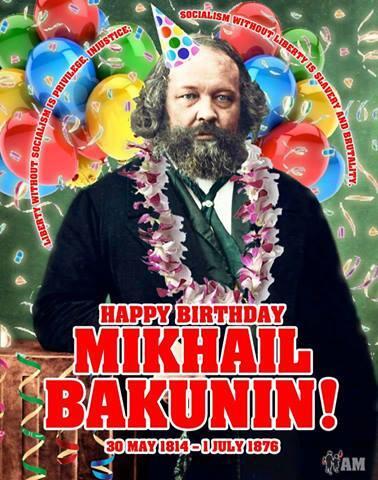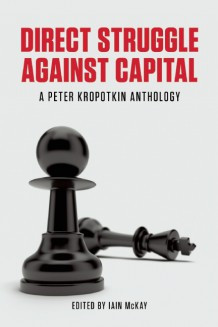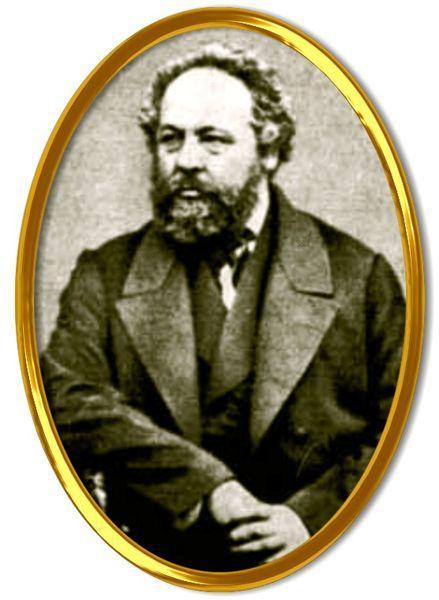Here is some more material from Bakunin, translated by Shawn Wilbur, on democracy, socialism and federalism, this time from 1868. It is in the form of a letter to Charles-Louis Chassin (1831-1901), a French democrat, who was in the process of establishing a political journal, La Démocratie (“Democracy). Chassin appears to have also become a member of the International, as he was one of the signatories to the 1870 appeal of the French Internationalists to the German people and democratic socialists against the Franco-Prussian War. Bakunin would have met Chassin at the September 1867 congress of the League of Peace and Freedom in Geneva, Switzerland, where Bakunin gave a speech in favour of socialist federalism. The League was a group of prominent European writers, republicans and democrats, including Victor Hugo, John Stuart Mill and the Italian revolutionary, Giuseppe Garibaldi, that sought to achieve peace and freedom for Europe. In his speech at the League’s September 1867 Geneva Congress, Bakunin argued that peace could only be secured through the abolition of the nation-state and the creation of federations of socialist communes and associations. He put forth his ideas in more detail in his essay, “Federalism, Socialism, Anti-Theologism,” which concluded with Bakunin’s famous declaration that “liberty without socialism is privilege, injustice; socialism without liberty is slavery and brutality.” Bakunin recapitulates these themes in this May 1868 letter to Chassin regarding the proposed program for “Democracy.” It is in this letter that Bakunin describes Proudhon as “the true master of us all.”
On the Program of “Democracy”
Need I say that as far as a foreigner may be allowed to meddle in your affairs, I sympathize with all my heart with your courageous enterprise and that I subscribe completely to your program? You have the noble ambition of restoring the press in your country to the heights from which it should never have descended, whatever the storms that have assailed it, and of once again accustoming is to seek our inspirations there, a habit that we have lost for nearly 19 years.
Be sure that, in all countries, all men to whom liberty and humanity are dear will happily salute the end of the French eclipse, even when they no longer have need of the resplendent sun of France in order to know their way.
The time of the messiah-peoples has passed. Liberty, justice, from now only no longer form the monopoly of any one nation. – The initiative, – to make use of the favorite expression of Mazzini, – that initiative (which, in the case of Dante, he wanted to bestow exclusively upon fair Italy, his homeland) belongs from now on to all the peoples; it is, to different degrees, it is true, divided among them all. This is a true division of labor, proportionate to the intellectual and moral power of each nation; and the last word of that division will be the federal organization of Europe.
All for each and all by each: such must be today our motto, our watchword. But the harmony would be very imperfect, it would be impossible, if the light and the powerful participation of France was lacking. That is the sense in which we all greet happily its reawakening to liberty.
I can only subscribe fully to the principle of decentralization that you set down as one of the principal bases of your program. Seventy-five years of sad, hard experience, passed in a fruitless tossing between a liberty, re-conquered several times, but always lost again, and the despotism of the increasingly triumphant State, have proven to France and that world that in 1793 your Girondins were in the right against your Jacobins. Robespierre, St.-Just, Carnot, Couthon, Cambon and so many other citizens of the Mountain have been great and pure patriots, but it remains no less true that they have organized the governmental machine, that formidable centralization of the State, which has made possible, natural and necessary, the military dictatorship of Napoleon I, which, surviving all the revolutions that have followed, in no way diminished, but on the contrary preserved, caressed and developed, through the Restoration, the July Monarchy and the Republic of 1848, has inevitably led to the destruction of your liberties.
Many of the democrats of the old unitary school – and I should even say Catholic school, although they are that most often without knowing it themselves – still think today that communal autonomy can suffice, and that with emancipated communes on one side, and on the other side a powerful centralization of the State, the organization of Liberty is possible. Such is the belief boldly professed by the illustrious Italian democrat Joseph Mazzini.
Despite the deep and sincere respect that I bear for this great creator of modern Italian unity, the distressing spectacle presented by that same Italy today would suffice by itself to make me doubt the goodness of his doctrine. I do not hesitate to say that Mazzini and all those who think like him fall into a profound error. No, communal autonomy will never be sufficient to establish liberty in any country; to isolated commune will always be too weak to resist the crushing centralization of all the legislative and executive powers in the State. – in order for communal Liberty to be real, an intermediary more powerful than the commune is required between the commune and the State: the autonomous department or province.
We can be certain that where commercial autonomy does not exist, the self-government of the commune will never be anything but a fiction. On the other hand, whatever Mazzini may say, a State powerfully centralized internally will never be anything externally but a war machine, which could enter into a federation of peoples in order to dominate it, but never to submit, on equal conditions with all the other nations, to the supreme law of international justice, that is to say purely human justice and, as such, contrary to the transcendent, theological, political and legal justice of the States.
I am happy to see the flag of anti-theologism bravely displayed in France. A mind enveloped in theological and metaphysical fictions, which bows before any authority whatsoever, other than that of rational and experimental science, can only produce the political and social slavery of a nation. Whatever is said by your representatives of the official morality and your spiritualist democrats, scientific and humanitarian materialism alone is capable of establishing liberty, justice, and consequently also morality on branches truly broad and unshakeable.
Isn’t it indeed a remarkable thing that, while the spiritualists, taking their point of departure in free will, end inevitably at the doctrine of authority, to the more or less open or masked, but always complete negation of liberty, – we materialists, we start from inevitability, both natural and social, in order to proclaim the progressive emancipation of humanity.
You are socialist. One does not have the right to call oneself a democrat today if, alongside the most complete political emancipation, one does not want as fully the economic emancipation of the people. You are a thousand times right to no longer wish to separate those two great questions which make up, in reality, only a single one: the political question and the social question.
Like you, I deplore the blindness of that party–and not too considerable a party, let us hope–of workers in Europe, who imagine that by abstaining from any intervention in the political affairs of their country, they serve that much better their own material interests, and who think that they could attain economic equality and justice, to which the working classes aspire today, by another road than that of liberty.
The unanimous testimony of the history of all times and all countries shows us that justice is never given to those who do not know how to take it themselves; logic confirms, by explaining it to us, that demonstration of history. It is not in the nature of a privilege, of a monopoly, of an existing power to cede or abdicate without being forced to do it; in order for right to triumph, it must become a force in its turn.
This truth is so simple, it is so well proven by the experience of each day, that we have the right to be astonished that people are still found who can doubt it. Equality without liberty is a noxious fiction created by the rogues to fool the sots. Equality without liberty is the despotism of the State, and the despotic State could not exist a single day without having at least an exploiting and privileged class; the bureaucracy, a hereditary power as in Russia and China, or de facto as in Germany and among you.
The great and true master of us all, Proudhon, has written, in his fine book on Justice in the Revolution and in the Church, that the most disastrous combination that could be formed would be that which would join together socialism with absolutism, the tendencies of the people toward economic emancipation and material well being with [the dictatorial] concentration of all political and social powers in the State.
So let the future preserve us from the favors of despotism; but let it save us from the disastrous and mind-numbing consequences of authoritarian, doctrinaire or State socialism. Let us be socialists, but let us never become sheeplike peoples. Let us seek justice, all political, economic and social justice, only on the path of liberty. There can be nothing living and human apart from liberty, and a socialism that would cast it from its bosom or that would not accept it as the unique creative principle and basis would lead us straight to slavery and brutishness.
But if, on the one hand, we must energetically reject [repousser] every socialist system not inspired by the principle of collective and individual liberty, we must separate ourselves with the same energy and frankness from all the parties that declare their wish to remain strangers to the social question, the most formidable but also the greatest of all those questions that occupy the world today.
Your great revolution, which began its sublime work with the “Declaration of the Rights of Man” would only have ended when it had organized – not only in your country, but on the whole surface of the globe – society according to justice: a society that, at the beginning of the life of each of its members, whether of masculine or feminine sex, would have guaranteed equality from the point of departure, as that equality would depend on social organization, setting aside the natural differences between individuals; a society that, in economic and social respects, would offer to each the equally real possibility for all to raise themselves up – in proportion to the energy and individual capacities of each – to the greatest heights of humanity, first through education and instruction, then through the labor or each, freely associated or not associated – labor at once muscular and nervous, manual and intellectual, which, becoming the legitimate source of all individual, but not hereditary, property, would in the end be considered the principal basis of all political and social rights.
Such is, in my opinion, the last word of the revolutionary program. We could protest the difficulties of its realization; but we could not, without renouncing all logic, be unaware of what is there an absolute condition of true justice. And we who have renounced every theological faith in order to have the right and the power to embrace the human faith, we must still maintain the program of justice.
Finally you are persuaded, are you not, that all new wine must be poured in new bottles and that, turning your back on the henceforth exhausted mob of the cripples of theologism, of privilege, of anti-socialist democracy and transcendent politics, we should base all of our hopes on that party of the intelligent and studious, but not doctrinaire youth, who, feeling in themselves the need to merge with the mass of the people, in order to draw a life from it that ostensibly begins to be lacking in the higher regions of society, love, respect the people enough to have the right to instruct them and if necessary that of guiding them; – but especially on the working classes who, moralized by labor and not being exhausted by the abuse of the pleasures of life, are today the bearers and dispensers of every future?
Here is, my dear Chassin, my profession of faith. If it does not displease you too much, accept me among your numerous collaborators. In the meantime, please record me among your subscribers.
Michael Bakunin
La Voix de l’Avenir, May 24, 1868, Chaux-de-Fonds, Switzerland












































